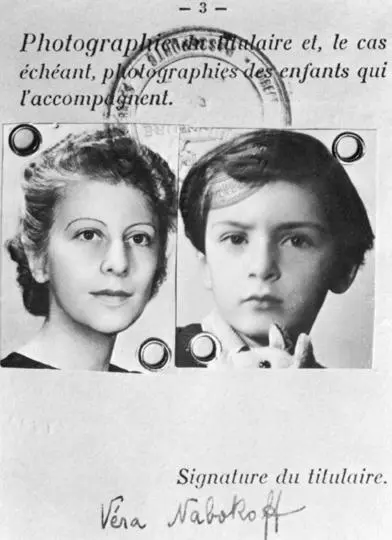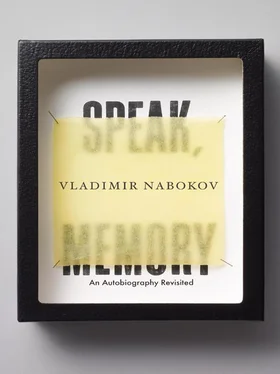Vladimir Nabokov - Speak, Memory
Здесь есть возможность читать онлайн «Vladimir Nabokov - Speak, Memory» весь текст электронной книги совершенно бесплатно (целиком полную версию без сокращений). В некоторых случаях можно слушать аудио, скачать через торрент в формате fb2 и присутствует краткое содержание. Город: New York, Год выпуска: 2011, ISBN: 2011, Издательство: Vintage International, Жанр: Биографии и Мемуары, на английском языке. Описание произведения, (предисловие) а так же отзывы посетителей доступны на портале библиотеки ЛибКат.
- Название:Speak, Memory
- Автор:
- Издательство:Vintage International
- Жанр:
- Год:2011
- Город:New York
- ISBN:978-0-307-78773-6
- Рейтинг книги:5 / 5. Голосов: 1
-
Избранное:Добавить в избранное
- Отзывы:
-
Ваша оценка:
- 100
- 1
- 2
- 3
- 4
- 5
Speak, Memory: краткое содержание, описание и аннотация
Предлагаем к чтению аннотацию, описание, краткое содержание или предисловие (зависит от того, что написал сам автор книги «Speak, Memory»). Если вы не нашли необходимую информацию о книге — напишите в комментариях, мы постараемся отыскать её.
Conclusive Evidence
Lolita
Pnin
Despair
The Gift
The Real Life of Sebastian Knight
The Defense
Speak, Memory — читать онлайн бесплатно полную книгу (весь текст) целиком
Ниже представлен текст книги, разбитый по страницам. Система сохранения места последней прочитанной страницы, позволяет с удобством читать онлайн бесплатно книгу «Speak, Memory», без необходимости каждый раз заново искать на чём Вы остановились. Поставьте закладку, и сможете в любой момент перейти на страницу, на которой закончили чтение.
Интервал:
Закладка:
I remember one particular problem I had been trying to compose for months. There came a night when I managed at last to express that particular theme. It was meant for the delectation of the very expert solver. The unsophisticated might miss the point of the problem entirely, and discover its fairly simple, “thetic” solution without having passed through the pleasurable torments prepared for the sophisticated one. The latter would start by falling for an illusory pattern of play based on a fashionable avant-garde theme (exposing White’s King to checks), which the composer had taken the greatest pains to “plant” (with only one obscure little move by an inconspicuous pawn to upset it). Having passed through this “antithetic” inferno the by now ultrasophisticated solver would reach the simple key move (bishop to c2) as somebody on a wild goose chase might go from Albany to New York by way of Vancouver, Eurasia and the Azores. The pleasant experience of the roundabout route (strange landscapes, gongs, tigers, exotic customs, the thrice-repeated circuit of a newly married couple around the sacred fire of an earthen brazier) would amply reward him for the misery of the deceit, and after that, his arrival at the simple key move would provide him with a synthesis of poignant artistic delight.
I remember slowly emerging from a swoon of concentrated chess thought, and there, on a great English board of cream and cardinal leather, the flawless position was at last balanced like a constellation. It worked. It lived. My Staunton chessmen (a twenty-year-old set given to me by my father’s Englished brother, Konstantin), splendidly massive pieces, of tawny or black wood, up to four and a quarter inches tall, displayed their shiny contours as if conscious of the part they played. Alas, if examined closely, some of the men were seen to be chipped (after traveling in their box through the fifty or sixty lodgings I had changed during those years); but the top of the king’s rook and the brow of the king’s knight still showed a small crimson crown painted upon them, recalling the round mark on a happy Hindu’s forehead.
A brooklet of time in comparison to its frozen lake on the chessboard, my watch showed half-past three. The season was May—mid-May, 1940. The day before, after months of soliciting and cursing, the emetic of a bribe had been administered to the right rat at the right office and had resulted finally in a visa de sortie which, in its turn, conditioned the permission to cross the Atlantic. All of a sudden, I felt that with the completion of my chess problem a whole period of my life had come to a satisfactory close. Everything around was very quiet; faintly dimpled, as it were, by the quality of my relief. Sleeping in the next room were you and our child. The lamp on my table was bonneted with blue sugarloaf paper (an amusing military precaution) and the resulting light lent a lunar tinge to the voluted air heavy with tobacco smoke. Opaque curtains separated me from blacked-out Paris. The headline of a newspaper drooping from the seat of a chair spoke of Hitler’s striking at the Low Countries.
I have before me the sheet of paper upon which, that night in Paris, I drew the diagram of the problem’s position. White: King on a7 (meaning first file, seventh rank), Queen on b6, Rooks on f4 and h5, Bishops on e4 and h8, Knights on d8 and e6, Pawns on b7 and g3; Black: King on e5, Rook on g7, Bishop on h6, Knights on e2 and g5, Pawns on c3, c6 and d7. White begins and mates in two moves. The false scent, the irresistible “try” is: Pawn to b8, becoming a knight, with three beautiful mates following in answer to disclosed checks by Black; but Black can defeat the whole brilliant affair by not checking White and making instead a modest dilatory move elsewhere on the board. In one corner of the sheet with the diagram, I notice a certain stamped mark that also adorns other papers and books I took out of France to America in May 1940. It is a circular imprint, in the ultimate tint of the spectrum— violet de bureau . In its center there are two capital letters of pica size, R.F. , meaning of course République Française . Other letters in lesser type, running peripherally, spell Contrôle des Informations . However, it is only now, many years later, that the information concealed in my chess symbols, which that control permitted to pass, may be, and in fact is, divulged.

Chapter 15
1
THEY are passing, posthaste, posthaste, the gliding years—to use a soul-rending Horatian inflection. The years are passing, my dear, and presently nobody will know what you and I know. Our child is growing; the roses of Paestum, of misty Paestum, are gone; mechanically minded idiots are tinkering and tampering with forces of nature that mild mathematicians, to their own secret surprise, appear to have foreshadowed; so perhaps it is time we examined ancient snapshots, cave drawings of trains and planes, strata of toys in the lumbered closet.
We shall go still further back, to a morning in May 1934, and plot with respect to this fixed point the graph of a section of Berlin. There I was walking home, at 5 A.M., from the maternity hospital near Bayerischer Platz, to which I had taken you a couple of hours earlier. Spring flowers adorned the portraits of Hindenburg and Hitler in the window of a shop that sold frames and colored photographs. Leftist groups of sparrows were holding loud morning sessions in lilacs and limes. A limpid dawn had completely unsheathed one side of the empty street. On the other side, the houses still looked blue with cold, and various long shadows were gradually being telescoped, in the matter-of-fact manner young day has when taking over from night in a well-groomed, well-watered city, where the tang of tarred pavements underlies the sappy smells of shade trees; but to me the optical part of the business seemed quite new, like some unusual way of laying the table, because I had never seen that particular street at daybreak before, although, on the other hand, I had often passed there, childless, on sunny evenings.
In the purity and vacuity of the less familiar hour, the shadows were on the wrong side of the street, investing it with a sense of not inelegant inversion, as when one sees reflected in the mirror of a barbershop the window toward which the melancholy barber, while stropping his razor, turns his gaze (as they all do at such times), and, framed in that reflected window, a stretch of sidewalk shunting a procession of unconcerned pedestrians in the wrong direction, into an abstract world that all at once stops being droll and loosens a torrent of terror.
Whenever I start thinking of my love for a person, I am in the habit of immediately drawing radii from my love—from my heart, from the tender nucleus of a personal matter—to monstrously remote points of the universe. Something impels me to measure the consciousness of my love against such unimaginable and incalculable things as the behavior of nebulae (whose very remoteness seems a form of insanity), the dreadful pitfalls of eternity, the unknowledgeable beyond the unknown, the helplessness, the cold, the sickening involutions and interpenetrations of space and time. It is a pernicious habit, but I can do nothing about it. It can be compared to the uncontrollable flick of an insomniac’s tongue checking a jagged tooth in the night of his mouth and bruising itself in doing so but still persevering. I have known people who, upon accidentally touching something—a doorpost, a wall—had to go through a certain very rapid and systematic sequence of manual contacts with various surfaces in the room before returning to a balanced existence. It cannot be helped; I must know where I stand, where you and my son stand. When that slow-motion, silent explosion of love takes place in me, unfolding its melting fringes and overwhelming me with the sense of something much vaster, much more enduring and powerful than the accumulation of matter or energy in any imaginable cosmos, then my mind cannot but pinch itself to see if it is really awake. I have to make a rapid inventory of the universe, just as a man in a dream tries to condone the absurdity of his position by making sure he is dreaming. I have to have all space and all time participate in my emotion, in my mortal love, so that the edge of its mortality is taken off, thus helping me to fight the utter degradation, ridicule, and horror of having developed an infinity of sensation and thought within a finite existence.
Читать дальшеИнтервал:
Закладка:
Похожие книги на «Speak, Memory»
Представляем Вашему вниманию похожие книги на «Speak, Memory» списком для выбора. Мы отобрали схожую по названию и смыслу литературу в надежде предоставить читателям больше вариантов отыскать новые, интересные, ещё непрочитанные произведения.
Обсуждение, отзывы о книге «Speak, Memory» и просто собственные мнения читателей. Оставьте ваши комментарии, напишите, что Вы думаете о произведении, его смысле или главных героях. Укажите что конкретно понравилось, а что нет, и почему Вы так считаете.










